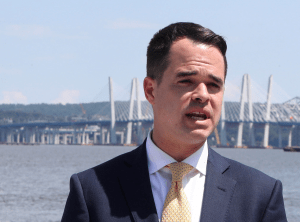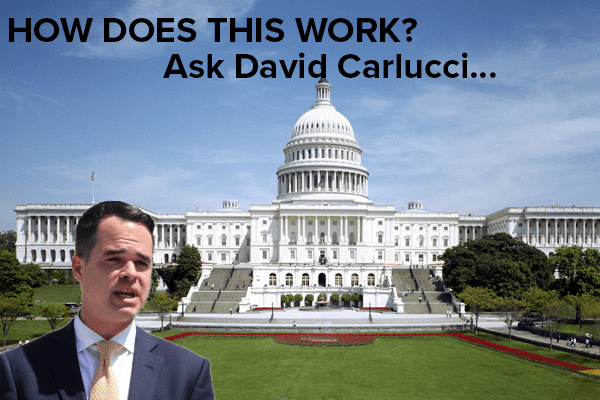|
RCBJ-Audible (Listen For Free)
|
David Carlucci Explains What Came Out Of Compromise On The Debt Ceiling Negotiations
By David Carlucci
If you tuned into your preferred national news network or scrolled through your newsfeed sometime in the past month, you most definitely have heard talks about the country’s ‘debt limit’ or ‘debt ceiling’. Luckily for the global economy, (and quite frankly, the headaches caused by partisan politics), President Joe Biden and Speaker of the House Kevin McCarthy came to a bi-partisan agreement on Sunday, May 28th.
But why is the debt limit such a pressing issue, and what would have happened if Biden and McCarthy could not arrive at a compromise? What exactly is in the Biden-McCarthy agreement? How will it affect the life of the average American? Instead of reading the 99-page bill text, check out this article to learn more about the deals that helped avoid a national default.
Why the Hurry?
 The debt limit or debt ceiling refers to how much the federal government can borrow to finance agreed-upon expenditures. At the beginning of the legislative session, Congress decides how much money it spends on government programs during the appropriations process. Because the United States runs on deficit spending, meaning it spends more than it collects in tax revenue, the federal government must borrow large sums of money to pay for the budget. Approving a rise in the debt ceiling allows the government to pay its bills by borrowing money. The Department of the Treasury gave Congress and the President until the beginning of June to raise the country’s debt ceiling above $31.46 trillion.
The debt limit or debt ceiling refers to how much the federal government can borrow to finance agreed-upon expenditures. At the beginning of the legislative session, Congress decides how much money it spends on government programs during the appropriations process. Because the United States runs on deficit spending, meaning it spends more than it collects in tax revenue, the federal government must borrow large sums of money to pay for the budget. Approving a rise in the debt ceiling allows the government to pay its bills by borrowing money. The Department of the Treasury gave Congress and the President until the beginning of June to raise the country’s debt ceiling above $31.46 trillion.
Although the United States has never defaulted on its obligations, experts predict catastrophic immediate and long-term consequences if Congress fails to reach an agreement. Instantly, failure to raise the debt limit would send global markets to plunge, destroying all types of personal savings and investment funds.
Plenty of government benefits such as Medicare, Medicaid, veterans affairs, and SNAP would be severely reduced or cut. Also, the US Dollar would immediately cease to be the most stable investment on the planet, leading to a spike in interest rates in all areas. Depending on the length of the default, the United States could eventually lead the world to a recession and potentially depression.
The Bi-Partisan Compromise
The debt ceiling issue turned into a partisan debate around energy projects, SNAP requirements, funding for new IRS agents, and many other topics. Fortunately, the President and Speaker came to a deal days before the June 5th deadline, culminating in the 99-page Fiscal Responsibility Act of 2023 filled to the brim with victories and concessions for both sides of the aisle.
First and foremost, the Fiscal Responsibility Act agrees to increase the federal debt limit. Congress avoided the default crisis until the end of the next Presidential election in 2024. Additionally, the bill introduces new spending limits for the 2024 and 2025 fiscal years. Spending is capped at 1% for 2025 in all areas except for defense and veteran affairs.
Republicans stepped away from the negotiating table with various spending cuts and other political victories. One of the most controversial provisions in the debt limit bill tightens work requirements for SNAP benefits. It requires all able-bodied adults aged 40 to 54 without dependents to work at least 80 hours a month to receive benefits. Democrats secured waivers for veterans, young adults previously in foster care, and those facing homelessness.
The bill also calls for the return of all unspent COVID relief funds. Congress voted to end the COVID-19 Emergency on March 11th. With the national public health emergency over, Republicans wanted to see the floating $30 billion returned to the government.
Democrats also benefited beyond paying the country’s bills. Up to the agreement, Republicans spoke heavily about cutting funding for hiring 87,000 new IRS agents as outlined in the Inflation Reduction Act. Democrats argue that these new hires are necessary for holding wealthy taxpayers financially accountable, but Republicans fear bureaucratic overstep. Following Sunday’s deal, Democrats ended up on top with $78.1 billion out of the original $80 billion, allowing for 85,260 more IRS agents, not 87,000.
Environmental Consensus
Both parties achieved an equal win over the environmental review process for energy projects. Under the new provision, environmental agencies must complete environmental reviews within one to two years depending on the complexity of the energy project. In comparison, the current environmental review takes an average of 5 years to complete. For Republicans, this means more fossil fuel projects, and for Democrats, this means faster development on renewable energy.
The Mountain Valley Pipeline project is the most notable site to benefit from this change. The project plans to send methane gas through Virginia and West Virginia, home of Senator Joe Manchin, the most distinguished swing vote in the Senate. It is believed that this provision was added to obtain the Democratic West Virginian’s support.
Reasons for the ‘Nays’
The House voted to pass the Fiscal Responsibility Act Wednesday with 314 Ayes and 117 Nays and then in the Senate on Thursday in a 63-36 vote. Nay votes came from both political parties, mainly from those on the respective fringe of their ideological group.
Democratic opponents of the bill, Progressive Democrats, claim raising the debt ceiling should not have come at the expense of cutting government programs for lower-income individuals. More so, some Democrats see this deal as a missed opportunity for placing tax hikes on wealthy Americans.
Following her vote, Congresswoman Ayanna Pressley (MA-07) issued a statement writing, “For months, Speaker McCarthy and Republicans have held our economy hostage and presented the American public with a false choice: impose harmful cuts and restrictions on life-saving government programs or endure the economic catastrophe of a default on our national debt. While I have consistently supported raising the debt ceiling, I could not in good conscience support a bill that takes food away from hungry people, forces borrowers back into our broken student loan system, and perpetuates environmental injustice—while leaving the bloated defense budget intact and making it easier for the ultra-wealthy to avoid paying their fair share in taxes.”
Republican Senator Rand Paul (R-KY) was also one of the opponents of the Fiscal Responsibility Act. In an interview on FOX Business’ “Mornings with Maria”, Senator Paul stated that there was “nothing conservative” about the Biden-McCarthy deal. “[The government] can spend as much money as they can possibly spend, borrow as much money as they want. No limits on borrowing for two years.” Paul proposed a more conservative alternative to the debt agreement that would balance the national budget in five years through caps on total spending.
What Now?
With the Fiscal Responsibility Act passing both the Senate and the House, it was up to President Biden to sign off on the nation’s credit card bills. The President signed the bill on Monday and averted the national default. With that, the debt ceiling debate has been pushed aside until after the next Presidential Election.
David Carlucci consults organizations on navigating government and securing funding. He served for ten years in the New York Senate.
















